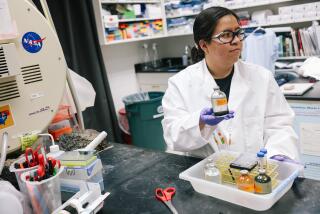Young Scientists to Probe Outer Space at Camp
- Share via
“Martians” and earthlings are meeting at Poindexter Park this week to learn about the solar system and its inhabitants.
It’s not a case of little green men teaching humans in Moorpark a thing or two about life beyond Earth’s atmosphere. Instead, 20 young scientists of tomorrow are getting a hands-on education in outer space at a weeklong day camp sponsored by Science Adventures, a Huntington Beach-based company that provides science instruction and materials for schools.
Half the group call themselves Martians while the others are earthlings. But no matter what title the children go by, the fun is learning about life in outer space, said 8-year-old Spencer Crittenden of Moorpark, who on a recent day was in the group of earthlings.
“This is a lot of fun,” he said while making a clay model of the solar system. “I’m going to work at NASA when I grow up, but I’m not going to go into space. I’m going to make things like the Mars rover.”
Zac Geiger, a 7-year-old earthling, said he is interested in space travel as a way to ease tensions on Earth.
“I would like to help colonize Mars,” said the Moorpark youngster who, like so many others, has been moved by the images sent back from Mars by the rover Sojourner.
“Earth is being overpopulated. Scientists think that Mars might have the right atmosphere and terrain that humans could colonize,” Zac said.
In the next breath, he was trying to figure out how long it would take to get from Earth to Mars.
Such pondering is welcomed by instructor Kelli Hornachek, who said children often do not receive enough science education.
Hornachek was helping day campers with their solar system projects, which involved clay and marking pens.
“Why does Venus look yellow and white?” she asked 8-year-old Kenny Kozovich of Moorpark. “Because of the atmosphere,” he replied. The brightest and sixth-largest planet has a dense atmosphere of carbon dioxide.
Over in the Martian camp, the lesson was rocketry, and 8-year-old Nicholas Sarrocco of Moorpark was clear on why rockets are important to science: “So you can see in space.”
On Friday, children from Moorpark will take a field trip to California State University Northridge, where they will launch their rockets alongside hundreds of other youngsters taking part in Science Adventures day camps across Southern California.
“These rockets will go about 100 mph and will fly about 500 feet in the air,” said instructor Adrianne Levy.
The one thing lacking from the week’s adventure is girls, a trend that Levy said is apparent in science courses across the country.
“Teachers will tell you it’s because of the stereotype of science being gooey and icky,” Levy said.
Turning to her group of Martians, Levy said, “But we’re not gooey and icky here, are we?”






